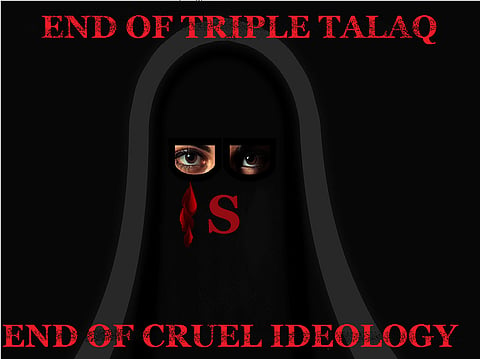
- Home
- न्यूजग्राम
- NewsGram USA
- India
- World
- Politics
- Entertainment
- Culture
- Lifestyle
- Economy
- Sports
- Sp. Coverage
- Misc.
- NewsGram Exclusive
- Jobs / Internships

Aug 22, 2017: The Apex Court today has made a historical verdict by imposing a ban on triple talaq calling it 'unconstitutional'. Supreme Court also upheld the validity by stating that it is not the violation of Article 14, 15, 21 and 25 of the Indian Constitution.
A bench of five judges, directed by Chief Justice J S Khehar, declared a split verdict. The verdict of five judges also came from five faiths. Justices Uday Lalit (Hindu), Joseph Kurien (Christian) and Rohinton Nariman (Parsi) decreed that triple talaq is unconstitutional. Chief Justice JS Khehar(Sikh) and Justice Abdul Nazeer(Muslim) supported the validity of triple talaq. Chief Justice also asked the government to bring enactment within the period of six months and proposed all political parties to decide on the issue collectively.
Triple Talaq (Talaq-e-Biddat) is a verbal divorce where a Muslim husband can divorce his wife by merely uttering "Talaq Talaq Talaq". A divorced woman is not allowed to remarry her divorced husband unless she first marries another man under the practice called Nikah Halala.
Prior to Independence, British Judges were assisted by Muftis and Qazis for the performing of executive functions in India. In 1880, Qazis were deprived of their judicial powers through 'The Qaziz Act'. On the other hand, the British started pronouncing judgments on Muslim Personal Law. Keeping the whole scenario in consideration, the establishment of Sharia courts was demanded in the first quarter of 20th century, however, the demand was not conceded. Later in 1920, the first sharia court was established in Bihar.
Many mosques in the country are functioning on Sharia courts based on Muslim Shariat law. The source of Muslim Personal law is the 1937 act of Muslim Personal Law (Shariat) application, which was also an attempt by British India to win over Muslim clergy. These extra-constitutional bodies had the power to function as courts parallel to Indian courts.
Abdur Rehman, a Muslim NRI from the UK had approached sharia court named Makkah Masjid Sharia Council in Chennai to get reunited with his wife. However, instead of reuniting the couple, Sharia court pressurized him to divorce his wife after he uttered talaq thrice. The man pleaded that he has changed his mind and he wants to reunite with her. After facing refutation from Sharia court, Abdul approached to Madras High Court begging for the same. He even said in his appeal that many blameless Muslim brothers or wives face the same problem across Chennai and Tamil Nadu on the whole because of the functioning of such forums that claim them to be judicial forums.
The High Court judgment said: "If a place of worship – whether it be a temple, mosque or church – is used for purposes other than prayers, and more specifically to create extra-constitutional forums, certainly the authorities are duty-bound to action against them."
It ordered the state government to ensure that such courts do not function. This order was not specific to Muslims, and it empowered the police authorities to close down such extra-constitutional court, whether run by Hindu, Christian or Muslim.
Although the judgment did pronounce on the behalf of the sufferers of sharia law, there were still some ambiguities that led to confusion among such extra-constitutional bodies. A large number of Sharia courts which were supervised by imams and Islamic scholars operated from places that were not Mosques. It was not clear that whether the order applies to only sharia courts performing from mosques or to those who operate from Madrassas and non-religious places. Hence, a further detailed clarification was needed.
In 2014, Supreme Court declared the functioning of Sharia courts illegal and can be challenged in the court of law. On the contrary, Madras High Court did not make it clear owing to which the ambiguity in the Tamil Nadu state remained.
A Delhi based advocate, Vishwa Lochan Madan challenged the validity of the parallel courts run by institutions such as Dar-ul-Qaza, Darul-Iftaa and Dar-ul-Uloom Deoband which issued fatwas. Under his appeal, he highlighted the plight of a woman, Imana, who was asked by Dar-ul-Uloom, Deoband to leave her husband and children and live with her rapist, father-in-law in her case. Madan argued that Sharia courts meddles with the personal affairs and obstructs the religious and social freedom of Muslims.
According to Supreme Court, Islamic judges, who interpret religious law can only come into power when individuals submit voluntarily to them and that their decisions or fatwas are not legally binding. It also curtailed the forums like Dar-ul-Qaza, Darul-Iftaa and Dar-ul-Uloom Deoband to issue fatwas on the basis of complaints by strangers.
The Supreme Court stated, Religion cannot be allowed to be merciless to the victim. Faith cannot be used as a dehumanizing force. Fatwas touching upon the rights of an individual at the instance of rank strangers may cause irreparable damage and therefore would be absolutely uncalled for. It shall be in violation of basic human rights. It cannot be used to punish innocents.
After the contentious debate of several years, triple Talaq is outcasted from Indian social systems.
Here is how the nation celebrated the unprecedented verdict by Supreme Court:
Today is the remarkable day in the history of India where archaic, regressive and cruel practices like 'Triple Talaq' perished. This is also a new development towards the welfare of women. The verdict is empowering and unfettering.
NewsGram is a Chicago-based non-profit media organization. We depend upon support from our readers to maintain our objective reporting. Show your support by Donating to NewsGram. Donations to NewsGram are tax-exempt.
